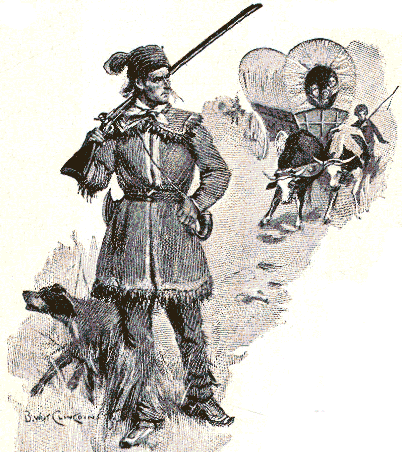Story of the Great Republic - Helene Guerber |
Whitman's Ride
Harrison being dead, John Tyler had to take his place. During his one term, Florida, the twenty-seventh state, was added to the Union. Although our country was already very large, the time was near when it was going to be even larger still.
It seems that, during Jackson's rule, a party of Indians traveled from Oregon to St. Louis, in quest of the "white man's Bible." They had heard of it from some traders, and the stories seemed so wonderful that they had journeyed many miles to get the book and some one to read and explain it to them.
 EMIGRANT AND PRAIRIE SCHOONER. |
It happened, however, that the people whom they asked for it were too busy or indifferent to pay much attention to this request from savages. Still, they kindly fed and clothed the Indians, and gave them many presents. After three of the messengers had died of fatigue and disappointment, the last sadly went home to tell their people that no one would listen to their prayer. The story of the long journey taken by these Indians, and of their pitiful requests, was told in the East, where it touched the hearts of many people; and missionaries were soon sent out to Oregon, to convert the Indians.
Two of these men set out with young brides, and journeyed slowly all the way across our continent. They traveled the greater part of the way in an emigrant wagon, or "prairie schooner," and, coming to the foot of the Rockies, were the first to take a wagon over those mountains. When they reached the Oregon country, which Americans and British still occupied in common, they found that the latter were trying to get sole possession of the land. Still, the Americans claimed that Oregon should belong to them, not only because Captain Gray first sailed into the Columbia River, but because Lewis and Clark explored it from the mountains to the sea, and Astor built the first trading post there.
After living at Walla-walla five years, one of the American missionaries, Dr. Marcus Whitman, heard that the British were about to send many settlers into the Oregon country, and then claim it as theirs, on the ground that there were more English than Americans living there. This news was told at a British trading post, where it was received with loud hurrahs, for the British thought they had got the best of the Americans at last.
Now, Dr. Whitman knew that the United States was then settling boundaries with Great Britain. He thought that if he could only get to Washington in time to tell the President and Senate what a beautiful and rich country Oregon really was, and how easily emigrants could reach it, they would not be willing to give it up without making an effort to keep it. Riding back to his farm in hot haste, he therefore told his wife and friends that he was going to start for Washington, and shortly after set out for a five months' ride. It was autumn when Dr. Whitman left home, and as he knew the season would not allow him to pass over the mountains by the way he had come, he journeyed farther south.
Through blinding snow and deep drifts, across frozen streams, and over mountains so steep and rough that it seemed almost impossible to climb them at all, Whitman made his way. After thrilling adventures with wolves and bears, and many hairbreadth escapes, he reached Great Salt Lake, then Santa Fe, and, following the trail from there, came to St. Louis. Thence it was easy to leach Washington, where he told both President and Congress all about Oregon, and offered to lead a train of emigrants into that territory.
By the Ashburton treaty, which had just been signed with Great Britain, the boundary between Maine and New Brunswick had been settled. But, fortunately, nothing had been said about Oregon. The news of Whitman's daring ride, and of his desire to people Oregon with Americans, rapidly spread all over the country. Before long, many pioneers were ready to accompany him, and when he began his return journey two hundred emigrant wagons followed him across the plains and over the mountains.
Although the British made sundry attempts to stop them, they were followed by so many others that, three years after Whitman's famous ride, no less than twelve thousand Americans had passed into Oregon. Our countrymen thus proved so much more numerous than the English that they soon claimed the whole territory, asking that the boundary be drawn at the parallel of 54° 40'. The British, however, did not wish to give up so much land. So, before long, a quarrel arose, and the Americans began to cry that they would fight Great Britain unless it consented to what they wished.
Many people justly considered that this was a very foolish way of acting, and Webster made one of his fine speeches to show both parties that it would be wiser to settle the dispute in another way. After a great deal of talk, and many threats about "fifty-four forty or fight," the United States finally thought best to accept the 49th parallel as its northern boundary from the Rocky Mountains to the Pacific Ocean (1846).